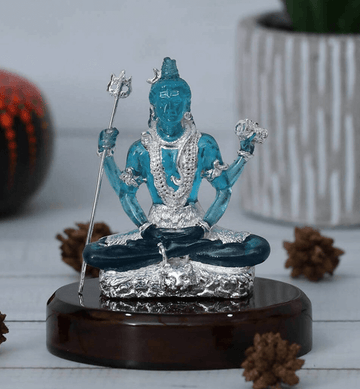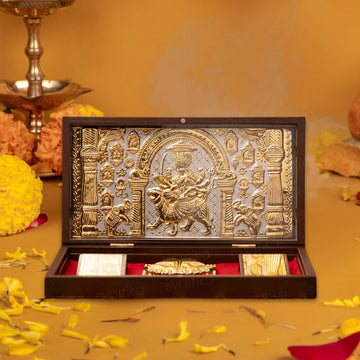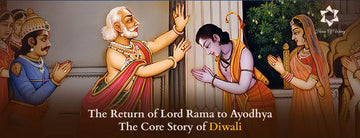108 Hanuman names: a timeless path to strength, devotion, and inner peace.
Introduction: Echoes of Faith That Still Resound
Have you ever stopped to watch an elderly devotee silently chanting the 108 Hanuman names with a rudraksha mala in one hand and a lifetime of belief in the other? This quiet, disciplined, and solitary act is a powerful embodiment of centuries of tradition, resilience, and spiritual power. Today, even as our homes are filled with the drone of machines and the glow of computer and television screens, chanting Hanuman Ji's names stands tall as a lighthouse, allowing restless hearts to find peace and purpose through their devotion to Hanuman.
For those living outside of India and physically distanced but emotionally linked to tradition, identity, and resilience, this chant is a whisper on levels to the divine.
But what is the source of power behind Hanuman idols and his names, and the number 108? We unpack the layers of these questions.
Cultural & Ritualistic Hanuman Ji Significance
Across India and in Hindu homes across the globe, Hanuman Ji is not simply worshipped; he is invoked. He is our spiritual reference point in times of need for protection, vitality, courage, etc.
The act of chanting the 108 Hanuman names is a lineage of practice steeped in our scriptures and oral traditions. It is a complete invocation of Hanuman and his traits.
Let's deconstruct the meaning!
-
The Scriptural Basis
In the Valmiki Ramayana, the Hanuman Chalisa, and Bhavishya Purana, Hanuman Ji is endowed with many, many attributes. Each name comes from his divine actions, as a warrior, scholar, beloved servant of Shri Ram, and destroyer of evil. Chanting the names invokes remembrance and further spiritual belonging. For those curious about the Hanuman Chalisa meaning, this practice deepens the experience even more.
-
The Bhakti aspect of each name
Each of the names is an aspect of Hanuman Ji's qualities. Mahabala looks to his uncluttered strength, while Rama Doota looks to his devotion. Chanting the names is not just repeating the names; it is embodying the qualities. This is the heart of Hanuman Ji bhakti, a deep emotional and spiritual resonance.
-
Spiritual Sadhana
In the bhakti traditions, especially Vaishnavism and Shaivism, to chant the names of deities is a means of nama japa, a sadhana (assignment) that transforms the mind, intention, and environment of wanting protection, vitality, courage, etc., into a being of divine energy. This is how Hanuman devotion India continues to thrive through ritual that becomes a lifestyle.
Why 108? Decoding the Sacred Number
The number 108 is neither coincidental nor superstitious. It's mathematical, mystical, and substantial; it is honored through its cultural relevance across Hinduism, Buddhism, and Jainism, and even the practice of yoga.
Here's why:
-
Cosmic Relationship:
It is a little beyond 108 times the diameter of the sun, forming exactly the distance from the Earth to the moon. Therefore, 108 in Hinduism can be taken to represent the balancing of the macrocosm and act as an interface between human ritual and celestial reality.
-
Spiritual Anatomy:
Yogic philosophy includes 108 nadis (energy channels), where the nadis come together at the heart chakra. It is believed that chanting a mantra or divine name 108 times is energizing and clearing to the nadis and can restore harmony to the body and mind. This is what makes the spiritual number 108 so powerful and healing.
-
Legacy of the Upanishads:
According to an ancient account, the sages of the past composed 108 Upanishads, each presenting a different set of spiritual truths or paths toward the final attainment of liberation (moksha). Therefore, the number has since stood for wholeness or spiritual completeness.
So when you chant the 108 Hanuman names, you are aligning yourself to cosmic order, internal balance, and divine consciousness.
How to Chant the 108 Names of Hanuman Ji: A Step-by-Step Guide
This sacred ritual, when introduced into everyday life, does not demand much. It only demands your full presence, sincere disposition, and reverence.
So let us walk through the whole procedure meaningfully:
-
Prepare Your Space:
Take time to create a very clean and quiet corner in your house. Place the image of Hanuman Ji on a small platform or shelf. Light a ghee lamp; if able, burn camphor or incense. The physical ambience prepares the mind for a turn inwards.
-
Create Mental Stillness:
Before the chanting begins, take a minute of silence to allow yourself to drop worldly concerns and centre yourself. Let your breath deepen and bring focus on Hanuman Ji.
-
Use of the 108-Beads Mala:
A Mala acts as a counter and spiritual tool. With every bead, utter one name, keeping your consciousness attached to the meaning. Touching the beads with your fingers creates a physical engagement with the process.
-
Chant with Meaning, Not Just Sound:
Whether the words are recited from a stotra or another half is chanted in audio, try to know what the name means. For example, Vayuputra (son of the wind god) is not just a title, but it reminds one of Hanuman Ji moving swiftly with a lot of energy. That’s what gives weight to the names of Hanuman explained in scripture and oral tradition.
Hanuman Ji and Modern Life: A Timeless Ally
Even in 2025, it is truly remarkable how the energy of the Hindu God Hanuman reflects the modern realities we face. As we struggle with stress and fear, and face struggles with identity, Hanuman Ji becomes relevant as a spiritual archetype we can tap into.
Here’s how:
-
For Students and Professionals:
When reciting the name, we are activating qualities of focus, tenacity, and discipline that Hanuman Ji exemplified in service to Shri Ram. By chanting the name before exams, interviews, and other important decision-making moments, we strengthen mental clarity and heart intelligence about what we are feeling.
-
For Family:
A simple ritual of chanting together three times in the evening with no more than 11 or 21 names creates a moment of shared peace for families. This teaches children to develop a spiritual vocabulary to grow with that is grounding and empowering when faced with uncertainties.
-
For you, Urban Spiritual Warriors:
Those of you who consider yourselves busy can chant the name and embody its energy during your morning walks, work meditation, or while commuting. It is portable, mutable, and a deeply intimate influence on our subconscious.
-
For the Global Indian Diaspora:
Living away from home can create challenges in the search for identity. Especially if there is no temple located on your street corner. A Hanuman idol on a shelf and the practice of soft chanting will create a sacred space anywhere you go. You reconnect with a heritage, language, or inner faith.
Astrology & Numerology Insights
In Vedic astrology, Mars or Mangal signifies the following energies: courage, energy, aggression, and ambition. An afflicted Mangal can cause impulsivity, anger, or chronic restlessness on the positive side. If Mangal is troubled, Hanuman Ji, born of Vayu with Shiva's energy, is considered the most powerful remedy.
Astrology solidifies the connection mentioned above in a number of ways:
- Chanting Hanuman prayers on Tuesdays (a day ruled by Mars) lessens or pacifies the negative effects of Mangal.
- In numerology, the vibration of the number 108 (1 + 0 + 8 = 9) corresponds to Mangal as well.
- Astrologers can prescribe Hanuman worship during periods of Manglik Dosh, Mars retrograde, or during Saturn-Mars transits to diffuse conflicts and injuries.
By incorporating spiritual devotion into a practice preceded by astrological precision, chanting becomes an intensely personal form of healing.
Integrating Wemy: Sacred Craftsmanship, Sacred Practice
At The House of Wemy, we know devotion is personal and visual; that's why our Hanuman idols are designed to do more than decorate a space; they are meant to energize a space.
- Timeless Aesthetic: Our idols borrow from classical Indian temples with details steeped in valor, modesty, and divinity.
- Perfectly Suited for Modern Interiors: No matter whether you occupy a minimalist studio or a grand villa, our idols suit every style of home while providing an exceptionally sacred sense of energy.
- A Gift with Meaning: A Hanuman idol, accompanied by a chanting booklet or diya stand, is an ideal gift for a housewarming celebration, birthday, or even self-gifting during difficult times.
Emotional & Community Connection
Let me share a memory that resonates in the hearts of so many:
"When I first moved to New York, I was struck by the silence in my apartment. It felt empty. My grandmother had always said the Hanuman Chalisa out loud every morning. To recreate her presence, I held my hands together in prayer and began to chant the 108 Hanuman names. One name a day, slowly and meditatively. Today, it is more than practice. It is a way for me to reconnect to my roots, to her voice, to Hanuman Ji."
In these moments, bhakti becomes more than a path - it becomes a connection across oceans, generations, and emotional divides.
Here is a list of the 108 names of Hanuman Ji (Shri Hanuman Ashtottara Shatanamavali) along with their meanings. These names praise Lord Hanuman’s strength, devotion, and divine qualities.
108 Names of Lord Hanuman with Meanings:
-
Om Hanumate Namah – The one with a large jaw
-
Om Mahaveeraya Namah – The great warrior
-
Om Hanumadrudatmakaya Namah – The soul of Hanuman
-
Om Anjanisutaya Namah – The son of Anjani
-
Om Vayuputraya Namah – The son of the Wind God
-
Om Mahabalaaya Namah – One with immense strength
-
Om Ramabhaktaaya Namah – The devotee of Lord Rama
-
Om Phalgunasakhaya Namah – Friend of Arjuna
-
Om Pingakshaya Namah – One with reddish-brown eyes
-
Om Amitavikramaaya Namah – Of immeasurable prowess
-
Om Udadhi-Kramanaya Namah – One who crossed the ocean
-
Om Sita-Shoka-Vinashakaya Namah – Destroyer of Sita’s sorrow
-
Om Lakshmanapranadata Namah – The one who revived Lakshman
-
Om Vajrakayaya Namah – One with a strong, thunderbolt-like body
-
Om Mahadyutaye Namah – With great radiance
-
Om Chiranjeevine Namah – The immortal one
-
Om Ramadutaya Namah – Messenger of Lord Rama
-
Om Dantaaya Namah – Calm and disciplined
-
Om Shantaya Namah – Peaceful
-
Om Prasannatmane Namah – Cheerful and pleasant soul
-
Om Shatakantamardanaya Namah – Slayer of demons
-
Om Lankineebhanjanaya Namah – Destroyer of Lanka’s guardian
-
Om Shrimate Namah – Honored and respected
-
Om Simhikapramathanaya Namah – Slayer of Simhika
-
Om Gandhamadana-Shailasthaya Namah – One who resides in Gandhamadana
-
Om Lankapurividayakaya Namah – One who burnt Lanka
-
Om Sugrivasachivaya Namah – Minister of Sugriva
-
Om Dheeraya Namah – The courageous one
-
Om Shooryaya Namah – The brave one
-
Om Dakshinmukhaya Namah – Facing south
-
Om Kanchanabhaaya Namah – One with a golden aura
-
Om Bheemaya Namah – The mighty
-
Om Raktamukhaya Namah – Red-faced
-
Om Pitambaraya Namah – Clothed in yellow
-
Om Varadayakaya Namah – Giver of boons
-
Om Vidyavaridhaye Namah – Ocean of knowledge
-
Om Vanchitaphaladayakaya Namah – Fulfiller of wishes
-
Om Satyavache Namah – One who speaks the truth
-
Om Satyasankalpaya Namah – True to his resolve
-
Om Kapishresthaya Namah – Best among the Vanaras
-
Om Mahatapase Namah – One who has performed great penance
-
Om Ramabhaktaya Namah – Eternal devotee of Rama
-
Om Pragnaya Namah – The wise
-
Om Ramakathashravanalolupaya Namah – Fond of listening to Lord Rama’s stories
-
Om Sita-Sameta-Shriramapadasevadharaya Namah – Servant of the feet of Sita-Rama
-
Om Vitaragaya Namah – Free from worldly attachments
-
Om Priyaya Namah – Beloved
-
Om Mahakaraya Namah – Giant-sized
-
Om Pratapavate Namah – Glorious
-
Om Shrutimataya Namah – Wise and learned
-
Om Sumanoharaya Namah – Handsome
-
Om Tejasvine Namah – Radiant
-
Om Baladakshaya Namah – Capable and strong
-
Om Satvavate Namah – Full of energy
-
Om Mantrajnaaya Namah – Knower of sacred chants
-
Om Karanapoorakaya Namah – One with adorned ears
-
Om Bhaktavatsalaya Namah – Affectionate towards devotees
-
Om Sanjeevananagahartre Namah – Bringer of Sanjeevani
-
Om Shuchaye Namah – Pure
-
Om Vagmine Namah – Eloquent speaker
-
Om Dridavratae Namah – Firm in vows
-
Om Maharshe Namah – Great sage
-
Om Niyataya Namah – Disciplined
-
Om Prabhave Namah – Powerful
-
Om Gunateetaya Namah – Beyond qualities
-
Om Gunine Namah – Full of virtues
-
Om Atmane Namah – The soul
-
Om Bhaktavasyaya Namah – Controlled by devotion
-
Om Mahanidhaye Namah – Great treasure
-
Om Sarvagaya Namah – All-knowing
-
Om Parvatavide Namah – Knower of mountains
-
Om Kumarabrahmacharine Namah – Celibate youth
-
Om Ratnakundaladharine Namah – Adorned with gem-studded earrings
-
Om Chanchaladvalasannaddhaya Namah – One with a fluttering scarf
-
Om Gandharvavidyalolupaya Namah – Interested in Gandharva knowledge
-
Om Mahakayay Namah – With a huge form
-
Om Tapanaya Namah – One who brings heat to enemies
-
Om Rudraveeryasamudbhavaya Namah – Born from Shiva’s power
-
Om Indrajitvadhaay Namah – Slayer of Indrajit
-
Om Vibhishanapriyakaraya Namah – Dear to Vibhishana
-
Om Dashagreevashirashchedine Namah – Cutter of Ravana’s heads
-
Om Shrutideepitavikramaya Namah – Famous for valor
-
Om Karagrahevimochakaya Namah – Liberator from prison
-
Om Sagarottarankaya Namah – Crosser of the ocean
-
Om Pragjnaya Namah – Enlightened
-
Om Ramapadabja-Sevakaya Namah – Servant of Rama’s lotus feet
-
Om Sarvalokasukhapradaaya Namah – Giver of happiness to all
-
Om Sarvabhitidaya Namah – Remover of all fears
-
Om Paramatmavide Namah – Knower of the Supreme Soul
-
Om Parasmai Namah – Supreme
-
Om Satyasatyaparakramaya Namah – Whose valor is both real and eternal
-
Om Yatinamparamadaaya Namah – Supreme goal of ascetics
-
Om Yoginamparamagatiye Namah – Ultimate refuge for yogis
-
Om Ramakatharasasiktaya Namah – Drenched in the essence of Rama’s stories
-
Om Janamangalakarakaya Namah – Bringer of good fortune to people
-
Om Doshanivarakaya Namah – Remover of faults
-
Om Vataatmajaya Namah – Son of Wind God
-
Om Pavanasutaya Namah – Son of Air
-
Om Mahakshayaya Namah – Great-bodied
-
Om Rameshtaya Namah – Beloved of Rama
-
Om Kundalino Namah – The awakened one
-
Om Ashokavanikachhetre Namah – One who entered Ashok Vatika
-
Om Sarvamayavibhanjanaya Namah – Destroyer of all illusions
-
Om Paravidyaparamparaya Namah – Master of higher knowledge
-
Om Balarkasadrashananaya Namah – Face like the rising sun
-
Om Vidayunmuktabandhanaya Namah – Liberated from all worldly bonds
-
Om Sharanyaraya Namah – The protector
-
Om Bhaktavatsalaya Namah – Kind to devotees
Final Thoughts
The 108 names of Hanuman Ji are the points of a spiritual guide. Each name is a light, and each chant a step towards strength, calm, and self-realization.
Brand new moms looking for a way to reinvigorate their faith or to invite their children into something eternal, this is a lovely place to begin.
When was the last time you took a moment to sit down, close your eyes, and call in Hanuman Ji? Perhaps today is that day.
Now, to help you out, browse Wemy's collection of handcrafted Hanuman idols, sacred home accessories and Hindu Spiritual Gift that can be a natural and beautiful part of day-to-day devotion.










